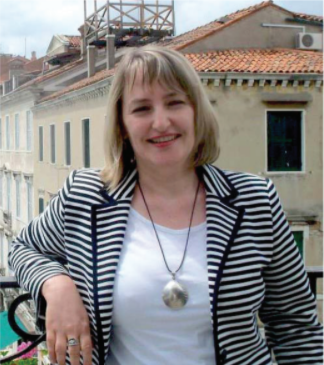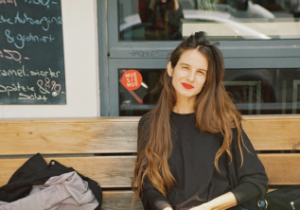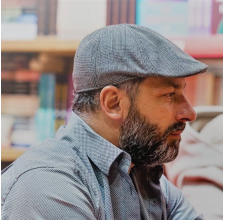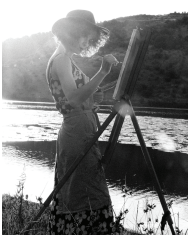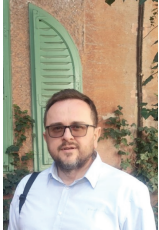Delina Fico is a prominent civil society leader and manager with expertise in advocacy, gender issues, institutional and individual capacity development, strategic development,
communication and public education. She is the co-founder of several leading women’s rights groups and services in Albania, and has strongly supported and supports LGBTI rights in Albania and serves in the Board of the Shelter for LGBTI Persons.
In Kosovo, Delina led the USAID-funded Women’s Economic and Political Empowerment Program. She has served as a Board member in a number of NGOs and NGO
networks in Kosovo and the U.S., including the Network of East West Women (NEWW), Open Society Foundation for Albania, and Kosova Women’s Network. She serves as the
Coordinator for the Central and Eastern Europe Alumni Network of the Tran-regional Center for Democratic Studies (TCDS) at the New School, New York City. Delina currently serves as the Director of Civil Society Programs at East West Management Institute Inc. (EWMI),
focusing on civil society, community development, and gender-related programs.
The impact of COVID-19 pandemic on women and girls in Western Balkans
The title of the article was borrowed from a poem by an unknown author. The poem made the rounds in social media as COVID-19 spread throughout the world. It reminds us of the fact that, just because of their gender, women and girls are negatively and disproportionately impacted by disasters across the board. It points to the fact that this new disaster, the storm of this unknown, unpredictable, and harmful virus exacerbated the existing inequalities and discriminations as the COVID-19 pandemic impacted particularly hard the lives of women and girls, the poor, LGBTIQ persons, people with disabilities, and other disadvantaged groups in the society, such as Roma in the Western Balkan countries.
Without a room of their own
On March 11, 2020, the World Health Organization declared that COVID-19 had taken the shape of a pandemic, meaning that it was spreading across several countries and was affecting a large number of people. In the weeks that followed, the governments of Western Balkan countries, that is the governments of Albania, Bosnia-Hercegovina, Kosova, Montenegro, North Macedonia, and Serbia declared the state of emergency (except for Montenegro) and imposed lockdown measures to curtail the spread of the pandemic. With some variances between the countries, during March and April 2020, most of the men and women, the elderly, youth, and children in all these countries practically stayed home. Towards the end of May 2020, the restrictive measures relaxed at some degree, but most offices remained closed, private sector activity continued to shrink, and kindergartens and schools remained closed. This new context led to an immediate and significant increase of domestic violence cases in all the Western Balkan countries. Confined at home, isolated from their friends, extended family, and colleagues, left with no easy access to a safe phone or a safe house, women in abusive relations were forced to live with the perpetrators all day long. The economic insecurity that came with the pandemic and the psychological pressures of a looming and threatening infectious disease put added pressure on strained family relations and gave the perpetrators an excuse to take out their worries on women and children. In Albania, the National Counselling Line for Women and Girls that manages the national hotline for gender-based violence (116117) received 3 times more phone calls during March – June 20020 compared to the same period a year ago and 30% more than during January – February 2020. In Bosnia-Hercegovina, the number of calls to SOS lines for domestic violence cases increased more than 50% starting in late March 2020, as compared to the preceding months. According to women’s rights activists in the region, the upward trend of violence against women and domestic violence reporting continued in the following months nearly in all the Western Balkans countries, similar to the rest of Europe. Meanwhile, women’s rights groups working with domestic violence cases fear that the COVID-19 related isolation measures coupled with family members’ control of victims’ movement may be preventing many women from reporting violence or seeking and getting assistance. That means that the incidence of domestic violence would be underreported, something that is true for domestic violence cases, as a rule.
Adapting and responding to violence against women and domestic violence in the context of COVID-19 was initially slow and insufficient throughout the Western Balkan countries. Responding to the cry for help by women and girls victims of domestic violence was a challenge. Under curfew, the police forces and prosecutors’ offices functioned with limited resources. The shelters for victims of domestic violence had to screen newcomers for COVID-19 before they allowed them in, so there was a need to shelter women victims of violence temporarily until they got tested for COVID-19 test and/or the shelters were ready to host them. Access to health services and counselling was limited as women and girls couldn’t leave home and public transportation was closed. There were also absurd situations such as in Serbia where in two cases reported to women’s rights groups[1], women who had tried to report domestic violence to police received a fine for violating the COVID-19 related curfew.
But, early on, women’s rights groups took the lead in ringing the bell about the high risk to women’s lives and wellbeing because of increased domestic violence in the context of the COVID-19 pandemic. They provided advice and support to the victims and pushed public institutions to acknowledge the aggravated situation of domestic violence and to step up their efforts to address this situation. As a result, in Albania, for example, although courts were closed starting in mid-March 2020, there was no interruption in the courts’ review and award of the orders for protection on domestic violence cases. There was also an increased pouring of solidarity not only by women’s rights activists, but also by other women and men for victims of gender-based violence. Such was the case of the Facebook page “Better together” (Më mirë së bashku) established by civil society organizations, lawyers, sociologists, doctors, business people, and others as a mechanism for providing free assistance and advice, among others, also to women and girls that were at risk of domestic violence. In Kosova, the Agency for Gender Equality established a new shelter for victims of domestic violence using students’ dormitories, so that women and girls could stay temporarily until they got tested for COVID-19 and the existing shelters could take them in. In Montenegro, the Women’s Rights Center worked with restaurants to provide free meals for women victims of domestic violence. In North Macedonia, the government promoted the SOS line for domestic violence reporting, cancelled the COVID-19 curfew requirement for victims of domestic violence, and provided a one-time, albeit insufficient, monetary support for these victims.
The COVID-19 pandemic is still around and doesn’t seem in a hurry to go away. This pandemic revealed the vulnerabilities of the health and social services, as well as the police in Western Balkan countries, in preventing domestic violence, as well as in responding to and addressing the needs of domestic violence victims. Hence, the need for governments in the region to prioritize efforts to prevent domestic violence, allocate the necessary resources to address the needs of women and girls victims of such violence, and to work closely with and support women’s rights organizations that work day in and day out to eliminate domestic violence and assist its victims to regain their freedom and a dignified life.
To hold more on your shoulders because you care
In the patriarchal society that we still live in, women’s place is still perceived to be primarily in the home. And, as it is often said, gender equality – and inequality – starts at home. With restrictions put in place to prevent the spread of COVID-19 in all the Western Balkan countries, like elsewhere, children attended school remotely, men and women lost their jobs or began working remotely, and access to some of the family support systems (such as elderly parents who take care of their grandchildren) was curtailed. “This situation had opposing consequences,” notes Lepa Mladjenovc, a renowned feminist, anti-war, and LGBTIQ people’s rights activist from Serbia. “For some women, it felt safe to stay at home, and for some women precisely because home is their place, it was expected that all the work is hers, it’s on her shoulders, including the emotional support for all family members.” Thus, women’s workload in their role as primary caretakers grew and became often more stressful as boundaries among work and private life were blurred and some of the school’s responsibilities fell on the parents shoulders. In cases where COVID-19 struck one of more family members, this translated in extra work for women as they cared for the sick and the rest of the family in the context of lack of space for separating one from the others. The situation was worse for women and girls that work in the health sector and in vital services, such as food stores and pharmacies, as their services were required and continue to be required during the pandemic, while the social support systems for their unpaid work at home are reduced.
But all women and girls are not on the same boat either. They are not a homogenous group. The COVID-19 pandemic’s impact on women and girls varies based on their social, economic, and cultural situation, as well as their sexual orientation and other parameters. Reports by women’s rights groups in the region demonstrate that in the first months of the pandemic, access to health services, including pre and post-natal care, termination of pregnancy, and contraceptives, was severely curtailed for women in rural areas or Roma women, as intercity travel and public travel halted and these women often don’t have the means to travel by private cars. While women in urban areas could just walk to their health center and those with better economic means could go there using a private car and could make use of private health care facilities. A Rapid Gender Assessment conducted by UN Women in late April 2020 in Albania, revealed that when it came to psychological and mental health, women were affected at much higher rates compared to men (69% vs. 57%), with a widening gap among active working women (35-44 years) who experience higher psychological distress compared to men in the same age group (72% vs 58%). The gender gap of mental health impact went up by 21 points in rural areas[2]. Women members of the LGBTIQ community who lost their jobs often were obliged to go back to their homophobic families and lost access to their social support systems. As working remotely was expanded and communication moved online, the big gap in access to internet and a computer for poor and rural women and girls and their families in all the Western Balkan countries heavily limited these women’s and their children’s access to health and social services, school, as well as to the support provided by community and civil society organizations.
Work is not safe anymore
The economic tsunami that followed and continues to develop on the heels of COVID-19 pandemic hit hard and in various ways women and girls in the workforce in all the Western Balkan countries, especially those that are engaged in the private sector. As businesses closed due to the impact of the pandemic, women along men lost their jobs in droves. In Albania, Bosnia-Hercegovina, Kosova, Montenegro, North Macedonia, and Serbia women work in larger numbers in some of the economic sectors that are most hit because of the pandemic: the tourism industry, the garment and footwear production industry, and retail. The loss of income and reduction of economic activity due to CPVID-19 pandemic is an added factor to the rise in the inequality and poverty levels, especially affecting women, particularly women heads of households, as well as female workers in the informal economy, domestic workers, rural women, and women in prostitution. To give an idea of the scale of the impact, tourism represents from 4.4% of the GDP in Albania to over 25% of GDP in Montenegro. The informal economy is estimated at between 30% and 40% of income and 18% of employment in North Macedonia and for and average of 30% of the GDP in Bosnia-Hercegovina. More than 91% of the 60,000 workers in the garment and footwear production sector in Albania are women and girls.
When women and girls could return to work as the COVID-19 related restrictions loosened up starting in late May 2020, some didn’t dare go back for fear of getting infected, some were asked to work fewer hours and paid less, although they delivered the same results, and some were unable to pay the loans that they use to pay with their salaries. The governments of all the Western Balkan countries provided various relief economic packages for workers and businesses, in particular small and medium businesses. This included in most of the countries direct salary support for men and women employed in the private sector, provided that the business owner would apply for such support. But women’s rights activists across the board say that these economic relief packages to address the impact of COVID-19 pandemic were and are, in the best case scenario, gender-blind: they were not preceded by a gender analysis of the impact of COVID-19 and did not address existing gender imbalances, as well as the needs of women and girls in disadvantaged groups, such as poor women, women heads of households, and women in informal economy. How could women that clean hotels, wash dishes in small restaurants, sell in the neighborhood markets, clean houses and work as baby sitters, who often work with no contract and no declared income prove that they deserved the direct salary support? There is also the concern that it was not easy to access these relief packages. For example, a women that owns a small family farm would have troubles to ensure documents required to benefit from the government’s economic relief: the public institutions functioned with reduced staff for several months since the pandemic began, intercity travel was cancelled for several months, and they don’t have easy access to internet to access e-government services when they exist.
The government-funded compensated salary (what in Albania they call ‘the war time salary’) and other economic relief measures helped, but major challenges remain as the economies of the Western Balkans, as elsewhere in the world, continue to shrink and women’s income remains crucial for many mid-level and low income families. Women’s rights groups and international organizations that promote gender equality are also worried about the possible longer-term effects of the COVID-19 pandemic on the balance between women’s professional and personal life and on women’s economic independence, since it may force many of them to make difficult choices and to move to unpaid work.
A seat at the table
On 30 March 2020, the European Commission announced that it would allocate €38 million in immediate funding to the Western Balkans to address pressing medical equipment and protection needs related to COVID-19 pandemic. It also announced a package of €374 million to support the social and economic recovery of the Western Balkans, including support to the private sector, increasing social protection, with specific attention to vulnerable groups, and strengthening the resilience of the public health sector. It is crucial that these aid packages and all the measures carried out by the governments of Albania, Bosnia-Hercegovina, Kosova, Montenegro, North Macedonia, and Serbia take in consideration the differing needs of men and women to inform the design and implementation of these measures. This needs to include consultations with women’s rights organizations, as experts in this field, as well as recognition of their expertise. As the Regional Coalition for Gender Mainstreaming the EU Accession Process state in their letter to Olivér Várhelyi, European Commissioner for Neighborhood and Enlargement, and Helena Dalli, European Commissioner for Equality, “these steps [are needed]…in ensuring a gender just approach is applied by the European Commission and implemented by Western Balkan governments, addressing the different needs and impact of the [COVID-19] crisis for women and men, and contributing to decreasing inequalities in the region.”

